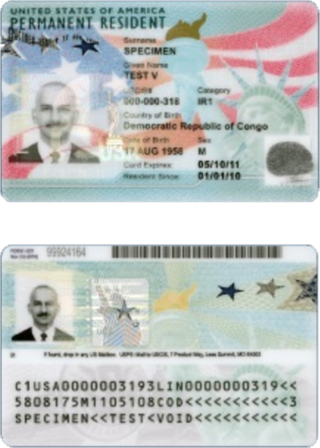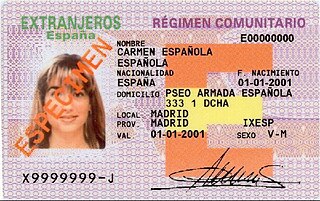
Permanent residency is a person's legal resident status in a country or territory of which such person is not a citizen but where they have the right to reside on a permanent basis. This is usually for a permanent period; a person with such legal status is known as a permanent resident. In the United States, such a person is referred to as a green card holder but more formally as a Lawful Permanent Resident (LPR).
The right of abode is an individual's freedom from immigration control in a particular country. A person who has the right of abode in a country does not need permission from the government to enter the country and can live and work there without restriction, and is immune from removal and deportation.

The right of abode (ROA) is an immigration status in the United Kingdom that gives a person the unrestricted right to enter and live in the UK. It was introduced by the Immigration Act 1971 which went into effect on 1 January 1973. This status is held by British citizens, certain British subjects, as well as certain Commonwealth citizens with specific connections to the UK before 1983. Since 1983, it is not possible for a person to acquire this status without being a British citizen.
A European Economic Area Family Permit was an immigration document that assisted the holder to enter the United Kingdom as a family member of a citizen of a contracting state to the European Economic Area agreement or a Swiss citizen. They were issued by the UK immigration authorities under the Immigration Regulations 2006 (UK).

European Economic Area (EEA) citizens have the right of free movement and residence throughout the EEA. This right also extends to certain family members, even if they are not EEA citizens. A Residence card of a family member of a Union citizen is issued to the family member to confirm this right of residence. The holder of a valid Residence Card is entitled to use this document in lieu of an entry visa for entry to all EEA member states. There is not a unified format for this card throughout the EU.

The Citizens’ Rights Directive 2004/38/EC sets out the conditions for the exercise of the right of free movement for citizens of the European Economic Area (EEA), which includes the member states of the European Union (EU) and the three European Free Trade Association (EFTA) members Iceland, Norway and Liechtenstein. Switzerland, which is a member of EFTA but not of the EEA, is not bound by the Directive but rather has a separate multilateral sectoral agreement on free movement with the EU and its member states.

The European Union itself does not issue ordinary passports, but ordinary passport booklets issued by its 27 member states share a common format. This common format features a coloured cover emblazoned—in the official language(s) of the issuing country —with the title "European Union", followed by the name(s) of the member state, the heraldic "Arms" of the State concerned, the word "PASSPORT", together with the biometric passport symbol at the bottom centre of the front cover.

The Schengen Area is an area comprising 27 European countries that have officially abolished passports and many other types of border control at their mutual borders. Being an element within the wider area of freedom, security and justice policy of the European Union (EU), it mostly functions as a single jurisdiction under a common visa policy for international travel purposes. The area is named after the 1985 Schengen Agreement and the 1990 Schengen Convention, both signed in Schengen, Luxembourg.
The Immigration Regulations 2006, amended by SI 2009/1117, SI 2011/1247 and SI 2015/694 and which have now been mostly repealed and superseded by the Immigration Regulations 2016, was a piece of British legislation which implemented the right of free movement of European Economic Area (EEA) nationals and their family members in the United Kingdom. It is based on Directive 2004/38/EC. It allows EEA citizens and their family members to live and work in the UK without explicit permission. Although Swiss citizens are covered by a separate bilateral agreement; they are treated basically the same as EEA nationals. Family members may need a special entry clearance to enter the UK.

The primary law governing nationality in the United Kingdom is the British Nationality Act 1981, which came into force on 1 January 1983. Regulations apply to the British Islands, which include the UK itself and the Crown dependencies, and the 14 British Overseas Territories.
Metock v Minister for Justice, Equality and Law Reform (2008) C-127/08 is a European Union law case, significant in Ireland and Denmark, on the Citizens Rights Directive and family unification rules for migrant citizens. Citizenship of the European Union was established by Article 20 of the Treaty on the functioning of the European Union (TFEU) and the Citizenship Directive 2004/38 elaborates the right of Union citizens and their family members to move and reside freely in the territory of a member state, consolidating previous Directives dealing with the right to move and reside within the European Community (EC).

The visa policy of Ireland is set by the Government of Ireland and determines visa requirements for foreign citizens. If someone other than a European Union, European Economic Area, Common Travel Area or Swiss citizen seeks entry to Ireland, they must be a national of a visa-exempt country or have a valid Irish visa issued by one of the Irish diplomatic missions around the world.
The Garda National Immigration Bureau is a unit of the Garda Síochána, the police force of the Republic of Ireland. It was formed in May 2000, and is responsible for the enforcement of immigration law in Ireland.

The Liechtenstein identity card is issued to Liechtenstein citizens by the Immigration and Passport Office in Vaduz. The card costs CHF150 for adults aged 15 or over and is valid for 10 years. For children, the card costs CHF30 and has a validity of 3 years.

National identity cards are issued to their citizens by the governments of most European Economic Area (EEA) member states, the exceptions are Denmark and Ireland. Ireland however issues a passport card which is a valid document in the EEA and Switzerland. Denmark issues simpler identity cards that are not valid as travel documents. From 2 August 2021, new identity cards are harmonized as a common identity card model replaced the various formats already in use. There are approximately 200 million national identity cards in use in the EU/EEA, including 53 million of the new EU-standard cards. They are compulsory in 14 EU countries, voluntary in 9 countries and in 8 countries they are semi-compulsory. Where the card is compulsory, in some member countries it is required to be carried at all times, while in other countries the mere possesion of the card is sufficient.
R v Immigration Appeal Tribunal and Surinder Singh [1992] 3 CMLR 358 is a UK immigration law and EU law case involving the right of entry and residence into a nation state.
A long-term resident in the European Union is a person who is not a citizen of an EU country but has resided legally and continuously within its territory for five years with a means of support and fulfills some further requirements, as defined in Directive 2003/109/EC. The status permits the holder some of the rights of free movement afforded to EU/EEA citizens in the participating countries; of the EU countries Denmark and Ireland do not participate in implementing the Directive. The implementation of the directive is left to the participating countries, with some national variations in the requirements for and benefits of long-term resident status.

The Immigration Regulations 2016, or EEA Regulations 2016 for short, constituted the law that implemented the right of free movement of European Economic Area (EEA) nationals and their family members in the United Kingdom. The regulations were repealed by the Immigration and Social Security Co-ordination Act 2020 on 31 December 2020, at the end of the transition period.
The European Union Settlement Scheme is an immigration regime of the United Kingdom introduced by the Home Office in 2019, under the new Appendix EU of the UK's Immigration Rules, in response to the Brexit situation. EUSS processes the registration of nationals of EU and EFTA countries who were resident in the United Kingdom prior to the end of the Brexit transition/implementation period at 11pm GMT on 31 December 2020. Successful applicants receive either 'pre-settled status' or 'settled status', generally depending on the length of time they have been resident in the United Kingdom.
In EU law, reverse discrimination occurs when the national law of a member state of the European Union provides for less favourable treatment of its citizens or domestic products than other EU citizens/goods under EU law. Since the creation of the Single Market, the right of EU citizens to move freely within the EU with their families. The right to free movement was codified in EU Directive 2004/38/EC which applies across the whole EEA. However, reverse discrimination is permitted in EU law because of the legal principle of subsidiarity, i.e. EU law is not applicable in situations purely internal to one member state. This rule of purely internal situation does not apply if the EU citizens can provide a cross-border link, e.g. by travel or by holding dual EU citizenship. EU citizens and their families have an automatic right of entry and residence in all EU countries except their own, with exceptions created by a cross-EU state border link. For example, an Irish citizen living in Germany with his family before returning to Ireland can apply for EU family rights. This is referred to as the Surinder Singh route. The cross-border dimension has been the focus of many court cases in recent years, from McCarthy to Zambrano.











